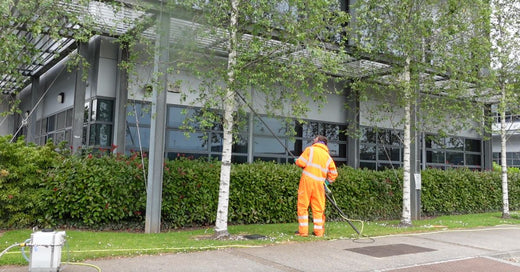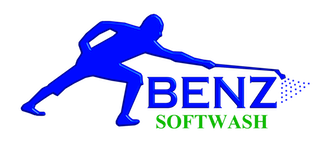
For a soft wash contractor to operate within the law when applying softwash chemicals they need to be aware of, and abide by, a number of regulations.
Unfortunately, because the H & S legislation has become so complex, few people fully understand it. This has led to much confusion and misunderstanding, often spread through ill-informed posts on online forums.
So we decided to dig deep into this mass of legislation and, as best we can, get to the truth and reality as to how the various laws relate to soft washing in the UK and Ireland.
The specific legislative bodies that regulate soft washing are:
- Health & Safety Executive (HSE) in the UK
- Control of Pesticides Regulations (COPR) in UK
- Pesticide Registration & Control Divisions (PRCD) in Ireland
- Biocidal Products Regulation (BPR) in EU, (GB BPR) in GB
- Registration, Evaluation, Authorisation of Chemicals regulation (REACH) in EU, including Ireland
- Control of Substances Hazardous to Health Regulations (COSHH) in UK
- Safety, Health and Welfare at Work Chemical Agent Regulations – in Ireland
The BPR regulates the sale and supply of biocidal products. It came into force in 2013 and is enforced by an individual country's competent authority. In the UK it is the HSE, specifically Control of Pesticides Regulations (COPR).
And in Ireland, the Pesticide Registration & Controls Division (PRCD) Biocides Division. The BPR states that "biocidal products must only be used by competent professionals who have received adequate training and instruction".
Soft washing mostly concerns the use of biocides (Benz Lightning Cleanze and Bio Cleanze are both biocides).
Bleach has been used for many years as a cleaning agent. But in recent years it has been inappropriately used to clean exterior surfaces. The misuse of chlorine products can result in properties being damaged and human health being adversely affected.
The breakthroughs we made with Lightning Cleanze were to find a surfactant that stays stable over a period of several months and to gain the government approvals for Lightning Cleanze to be used legally.
What makes Benz Lightning Cleanze legal for soft washing?
Lightning Cleanze is a sodium hypochlorite based biocide, which was first developed for a very large cleaning contract with a leading pharmaceutical manufacturer.
The customer required an SDS sheet and their health and safety regulations did not allow the practice of using non-approved, site-mixed chemicals. They were especially concerned because of the potentially dangerous nature of sodium hypochlorite.
Lightning Cleanze has PRCD and HSE numbers and approvals for soft washing exterior hard surfaces. The approvals set out guidelines on how it should be applied and onto what surfaces. It requires no additional mixing of chemicals, just dilution with water.
Lightning Cleanze when used correctly, and in accordance with the labelling and the guidelines on this website, complies with all REACH, BPR, HSE, PRCD, COPR and COSHH regulations.
At the time of writing, we know of no other sodium hypochlorite based softwash product that has all these approvals, which makes Benz Lightning Cleanze unique.
What makes bleach products illegal for soft washing?
For a number of years industrial, farm or swimming pool bleach has been for cleaning and disinfecting. More recently some people, without clear knowledge of the regulations and legality of their practice, have been self-formulating their own products.
A product for swimming pool chlorination will have a PRCD number and HSE approval, as will a farm grade SH. But these are not approved by the PRCD or HSE for use as soft washing chemicals. Using them outside of the approval criteria immediately makes their use illegal under BPR and REACH.
A company that supplies chemical products formulates them for a specific "intended use". Sterilising milking machine equipment or swimming pool disinfection are examples of intended use.
The actual act of mixing chemicals is very hard to mitigate and control. It puts the person doing the mixing in the position of being a "formulator" of a product, which carries it own set of insurances, practices and procedures under very tight REACH and COSHH regulations.
Therefore the practice of mixing unapproved sodium hypochlorite with unapproved additives does not comply with REACH, BPR, HSE, PRCD, COPR or COSHH and is illegal.
Important: A contractor using a non-approved product is using a product for other than its intended use, and will be contravening serious government legislation. In the event of an accident, injury to persons, or damage to property a contractor's insurance could be deemed void if they are found to have been using non-approved, and therefore illegal, chemical products.
Occupational Safety
UK Control of Substances Hazardous to Health (COSSH) and Irish Chemical Agents Regulations recommend on-site monitoring of possibly hazardous chemicals when used in the workplace.
The results from the monitoring, along with the chemical suppliers SDS sheet, are used for a company’s own COSHH assessment to determine what control measures need to be put into place when using the chemicals.
This assessment will determine, for example, if Respiratory Personal Equipment (RPE) will be required and if any public exclusion zones need to be put in place.
Chlorine in the workplace
The current European Occupational Exposure Limit (OEL) for chlorine is 1 ppm (parts per million). In Ireland and UK the value is lower. The 15-minute Short Term Exposure Limit (STEL) is 0.5 ppm, or 3 mg/m3.
We've monitored the release of chlorine during over 100 hours of spraying Lightning Cleanze on render and chlorine levels have never reached over 0.0 ppm STEL on our fully calibrated occupational gas monitor. These tests can be easily replicated.
We have never been able to make our gas monitor register above zero ppm when cleaning render with Lightning Cleanze. This is because the chlorine is dispersed into the atmosphere and is far enough away from the operator so as not to be ingested. Therefore it does not register on the monitor.
Our gas monitor has only risen above zero and reached the OEL in a confined space, with poor ventilation and when the product was applied to the ground.
If applying Lightning Cleanze in a sheltered area, or an area with poor ventilation, we recommend that the operator wear a suitable protective mask (Type B P2) as a precaution to prevent any inhalation of chlorine during the 30-60 minute activation period of the cleaning process.
In these situations, control measures must be put into place to protect members of the public during the 30-60 minute activation time. Under COSHH regulations alternative cleaning methods should be considered and the risk assessed.
The level of risk encountered when using a high pressure power washer, steam cleaner, or other chemicals, also need to be considered – and similar control measures may still need to be put into place.
In this situation Benz Lightning Cleanze is usually favoured because of the shorter time needed to carry out the work, the relatively small amount of water used and the ease of application.
Quick tip: This article is Part Two of a 2-Part series in which we elaborate on the facts around using sodium hypochlorite (SH) for soft washing. Click here to read Part One
We hope you found this information helpful and sincerely wish you great success in your soft washing business,
Team Benz
Click here to download a FREE Professional Softwash Pricing Guide
Click here to explore the full range of Benz softwash cleaning products
Legal disclaimer: All information and documentation available on this website and in Trade Tips articles is offered as a free service to our customers without warranty as to the information and documentation's legal standing or effectiveness. Downloading and use of the information and supportive documentation supplied on this website does not imply that we are acting as your authoritative and competent legal or technical advisers. Always do your own research and consult a qualified solicitor, accountant, or other relevant professional about any regulatory, legal or technical matter concerning your independent softwashing business.



Responses
Team Benz
Hi Francis, sorry to hear you are still having trouble with our free pricing guide. There is a link on this very page for it, and Ben did email it directly to you in April 2024, however he has just resent it to you now. Hopefully that gets you sorted. Have a fantastic day!
Team Benz
January 24, 2025
Francis Murtagh
Hi
I have tried to get your pricing guide for softwashing many times but it never gets sent?
January 24, 2025
Leo
Hi Mike – Sure, please see the email I’ve sent.
Best wishes
Leo
July 06, 2016
Mike Williams
Leo
Thanks for producing this article.
Re-assuring to hear Blackwash compliance.
Any chance of another meeting in the next few weeks just to catch up ?
Regards
Mike Williams 07852 126555
July 06, 2016
Leave a comment